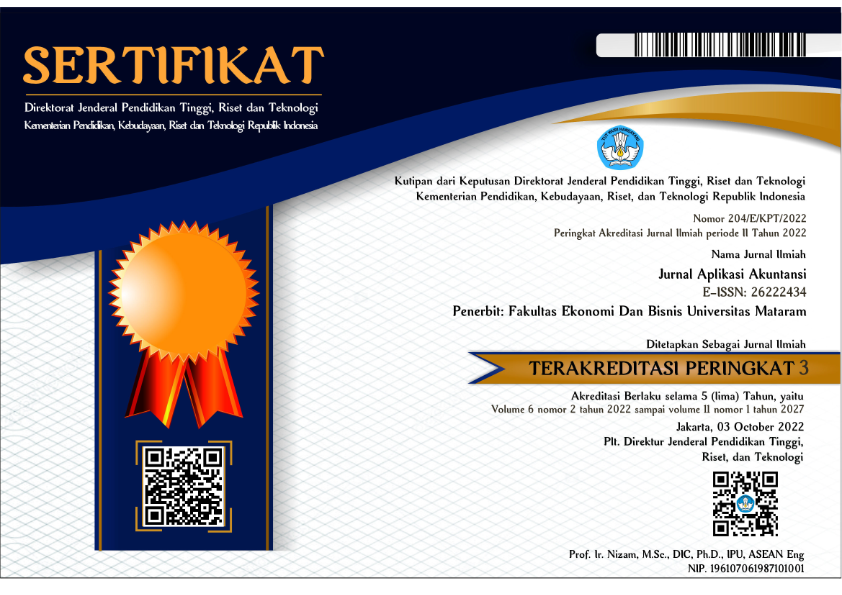GREEN CORPORATE SOCIAL RESPONSIBILITY: GREEN INNOVATION DAN NILAI PERUSAHAAN
DOI:
https://doi.org/10.29303/jaa.v6i2.137Keywords:
Green Corporate Social Responsibility (GCSR), Green Innovation, Company ValueAbstract
Teori pemangku kepentingan mengungkapkan bahwa semua informasi yang dipublikasikan oleh perusahaan dapat digunakan oleh semua pemangku kepentingan tanpa kecuali untuk mengambil keputusan. Green CSR (GCSR) merupakan komitmen perusahaan untuk menjaga lingkungan dengan mengurangi polusi, limbah, dan efek rumah kaca. GCSR menjadi pemicu bagi perusahaan untuk melakukan inovasi hijau (green innovation) dengan menggunakan material yang ramah lingkungan selama proses produksi dan juga menghasilkan produk yang ramah lingkungan. Penelitian ini bertujuan untuk menguji secara empiris hubungan langsung antara GCSR dan nilai perusahaan serta hubungan tidak langsung antara GCSR dan nilai perusahaan dengan inovasi hijau sebagai variabel mediasi. Sampel penelitian adalah seluruh perusahaan manufaktur yang go public di Bursa Efek Indonesia yang mengungkapkan GCSR periode 2017 - 2018 dalam rupiah. Berdasarkan kriteria sampel diperoleh 83 observasi. Pengujian hipotesis menggunakan analisis jalur dan Uji Sobel. Hasil penelitian menunjukkan bahwa GCSR mempengaruhi inovasi hijau (inovasi proses hijau dan inovasi produk hijau) dan inovasi proses hijau dan inovasi produk hijau mempengaruhi nilai perusahaan. Namun, GCSR tidak mempengaruhi nilai perusahaan dan inovasi proses hijau dan inovasi produk hijau bukan bagian dari mediasi parsial atau penuh, melainkan sebagai variabel independen.
References
Albort-Morant, G., Leal-Millán, A., & Cepeda-Carrión, G. (2016). The antecedents of green innovation performance: A model of learning and capabilities. Journal of Business Research, 69, 4912–4917. https://doi.org/10.1016/j.jbusres.2016.04.052
Ambec, S., Cohen, M. A., Elgie, S., & Lanoie, P. (2013). The porter hypothesis at 20: Can environmental regulation enhance innovation and competitiveness? Review of Environmental Economics and Policy, 7(1), 2–22. https://doi.org/10.1093/reep/res016
Ar, I. M. (2012). The Impact of Green Product Innovation on Firm Performance and Competitive Capability: The Moderating Role of Managerial Environmental Concern. Procedia - Social and Behavioral Sciences, 62, 854–864. https://doi.org/10.1016/j.sbspro.2012.09.144
Balabanis, G., Phillips, H. C., & Lyall, J. (1998). Corporate social responsibility and economic performance in the top British companies: Are they linked? European Business Review, 98(1), 25–44. https://doi.org/10.1108/09555349810195529
Baron, R. M., & Kenny, D. A. (1986). The moderator–mediator variable distinction in social psychological research: Conceptual, strategic, and statistical considerations. Journal of Personality and Social Psychology, 51(6), 1173–1182. https://doi.org/10.1177/1350506818764762
Ben Arfi, W., Hikkerova, L., & Sahut, J. M. (2018). External knowledge sources, green innovation and performance. Technological Forecasting and Social Change, 129, 210–220. https://doi.org/10.1016/j.techfore.2017.09.017
Blanco, B., Guillamón-Saorín, E., & Guiral, A. (2013). Do Non-socially Responsible Companies Achieve Legitimacy Through Socially Responsible Actions? The Mediating Effect of Innovation. Journal of Business Ethics, 117, 67–83. https://doi.org/10.1007/s10551-012-1503-3
Brainard, W. C., & Tobin, J. (1968). Pitfalls in Financial Model. In The American Economic Review (Vol. 58, Issue 2, pp. 99–122).
Burki, U., & Dahlstrom, R. (2017). Mediating effects of green innovations on interfirm cooperation. Australasian Marketing Journal, 25, 149–156. https://doi.org/10.1016/j.ausmj.2017.05.001
Cancino, C. A., La Paz, A. I., Ramaprasad, A., & Syn, T. (2018). Technological innovation for sustainable growth: An ontological perspective. Journal of Cleaner Production, 179, 31–41. https://doi.org/10.1016/j.jclepro.2018.01.059
Chang, C. H. (2011). The Influence of Corporate Environmental Ethics on Competitive Advantage: The Mediation Role of Green Innovation. In Journal of Business Ethics (Vol. 104, pp. 361–370). https://doi.org/10.1007/s10551-011-0914-x
Chen, Y. S. (2008). The driver of green innovation and green image - Green core competence. Journal of Business Ethics, 81, 531–543. https://doi.org/10.1007/s10551-007-9522-1
Chen, Y. S., Lai, S. B., & Wen, C. T. (2006). The influence of green innovation performance on corporate advantage in Taiwan. Journal of Business Ethics, 67, 331–339. https://doi.org/10.1007/s10551-006-9025-5
Cleff, T., & Rennings, K. (2000). Determinants of Environmental Product and Process Innovation — Evidence from the Mannheim Innovation Panel and a Follow-Up Telephone Survey. Innovation-Oriented Environmental Regulation, 9(5), 331–347. https://doi.org/10.1007/978-3-662-12069-9_16
De Medeiros, J. F., Ribeiro, J. L. D., & Cortimiglia, M. N. (2014). Success factors for environmentally sustainable product innovation: A systematic literature review. Journal of Cleaner Production, 65, 76–86. https://doi.org/10.1016/j.jclepro.2013.08.035
De Roeck, K., & Delobbe, N. (2012). Do Environmental CSR Initiatives Serve Organizations’ Legitimacy in the Oil Industry? Exploring Employees’ Reactions Through Organizational Identification Theory. Journal of Business Ethics, 110, 397–412. https://doi.org/10.1007/s10551-012-1489-x
Eiadat, Y., Kelly, A., Roche, F., & Eyadat, H. (2008). Green and competitive? An empirical test of the mediating role of environmental innovation strategy. Journal of World Business, 43, 131–145. https://doi.org/10.1016/j.jwb.2007.11.012
Fernando Yudi, Jabbour Charbel Jose Chiappetta, and W. W.-X. (2019). Pursuing green growth in technology firms through the connections between environmental innovation and sustainable business performance : does service capability matter.
Flammer, C. (2013). Corporate social responsibility and shareholder reaction: The environmental awareness of investors. Academy of Management Journal, 56(3), 758–781. https://doi.org/10.5465/amj.2011.0744
Freeman, R. E. (2004). The Stakeholder Approach Revisited. Zwfu, 5(3), 228–254. https://doi.org/10.1017/cbo9781139192675.003
Gallego-Álvarez, I., Prado-Lorenzo, J. M., & García-Sánchez, I. M. (2011). Corporate social responsibility and innovation: A resource-based theory. Management Decision, 49(10), 1709–1727. https://doi.org/10.1108/00251741111183843
Grewatsch, S., & Kleindienst, I. (2017). When Does It Pay to be Good? Moderators and Mediators in the Corporate Sustainability–Corporate Financial Performance Relationship: A Critical Review. In Journal of Business Ethics (Vol. 145). Springer Netherlands. https://doi.org/10.1007/s10551-015-2852-5
Hu, Y., Chen, S., Shao, Y., & Gao, S. (2018). CSR and firm value: Evidence from China. Sustainability (Switzerland), 10(12). https://doi.org/10.3390/su10124597
Huang, J. W., & Li, Y. H. (2017). Green Innovation and Performance: The View of Organizational Capability and Social Reciprocity. Journal of Business Ethics, 145, 309–324. https://doi.org/10.1007/s10551-015-2903-y
Hull, C. E., & Rothenberg, S. (2008). Firm performance: the interactions of corporate social performance with innovation and industry differentiation. Strategic Management Journal, 29, 781–789. https://doi.org/DOI: 10.1002/smj.675
Jayachandran, S Kalaignanam, K., & Eilert, M. (2013). Product and environmental social performance: Varying effect on firm performance. Strategic Management Journal, 34, 1255–1264. https://doi.org/10.1002/smj
Jiang Wenbo, Chai Huaqi, Shao Jing Shao, and F. T. (2018). Green entrepreneurial orientation for enhancing firm performance: a dynamic capability perspective.
Kivimaa, P., & Kautto, P. (2010). Making or breaking environmental innovation?: Technological change and innovation markets in the pulp and paper industry. Management Research Review, 33(4), 289–305. https://doi.org/10.1108/01409171011030426
Küçükoğlu, M. T., & Pınar, R. İ. (2015). Positive Influences of Green Innovation on Company Performance. Procedia - Social and Behavioral Sciences, 195, 1232–1237. https://doi.org/10.1016/j.sbspro.2015.06.261
Lee Ki-Hoon, and M. B. (2015). Green R&D for eco-innovation and its impact on carbon emissions and firm performance.
Lin, H., Zeng, S. X., Ma, H. Y., Qi, G. Y., & Tam, V. W. Y. (2014). Can political capital drive corporate green innovation? Lessons from China. Journal of Cleaner Production, 64, 63–72. https://doi.org/10.1016/j.jclepro.2013.07.046
Lin, R.-J., Tan, K., & Geng, Y. (2013). Market demand , green product innovation , and fi rm performance : evidence from Vietnam motorcycle industry. Journal of Cleaner Production, 40, 101–107. https://doi.org/10.1016/j.jclepro.2012.01.001
Long Xingle, Chen Yaqiong, Du Jianguo, Oh Keunyeob, Han Insoo, and Y. J. (2017). The effect of environmental innovation behavior on economic and environmental performance of 182 Chinese firms.pdf.
Ma, Y., Hou, G., & Xin, B. (2017). Green process innovation and innovation benefit: The mediating effect of firm image. In Sustainability (Switzerland) (Vol. 9). https://doi.org/10.3390/su9101778
Malik, M. (2015). Value-Enhancing Capabilities of CSR: A Brief Review of Contemporary Literature. Journal of Business Ethics, 127, 419–438. https://doi.org/10.1007/s10551-014-2051-9
Martinez-Conesa, I., Soto-Acosta, P., & Palacios-Manzano, M. (2017). Corporate social responsibility and its effect on innovation and firm performance: An empirical research in SMEs. Journal of Cleaner Production, 142, 2374–2383. https://doi.org/10.1016/j.jclepro.2016.11.038
Miao, C., Fang, D., Sun, L., & Luo, Q. (2017). Natural resources utilization efficiency under the influence of green technological innovation. Resources, Conservation and Recycling, 126(March), 153–161. https://doi.org/10.1016/j.resconrec.2017.07.019
Qi, G., Zeng, S., Li, X., & Tam, C. (2012). Role of Internalization Process in Defining the Relationship between ISO 14001 Certification and Corporate Environmental Performance. Corporate Social Responsibility and Environmental Management, 19(3), 129–140. https://doi.org/10.1002/csr.258
Reverte, C., Gómez-Melero, E., & Cegarra-Navarro, J. G. (2016). The influence of corporate social responsibility practices on organizational performance: Evidence from Eco-Responsible Spanish firms. Journal of Cleaner Production, 112, 2870–2884. https://doi.org/10.1016/j.jclepro.2015.09.128
Rexhepi, G., Kurtishi, S., & Bexheti, G. (2013). Corporate Social Responsibility (CSR) and Innovation–The Drivers of Business Growth? Procedia - Social and Behavioral Sciences, 75, 532–541. https://doi.org/10.1016/j.sbspro.2013.04.058
Stucki, T. (2019). Which firms benefit from investments in green energy technologies? – The effect of energy costs. Research Policy, 48(3), 546–555. https://doi.org/10.1016/j.respol.2018.09.010
Surroca, J., Tribo, J. A., & Waddock, S. (2010). Corporate responsibility and financial performance: The role of intangible resources. Strategic Management Journal, 31, 463–490. https://doi.org/10.1002/smj
Tanimoto, K. (2013). Encyclopedia of Corporate Social Responsibility. In Encyclopedia of Corporate Social Responsibility. Springer Berlin Heidelberg. https://doi.org/10.1007/978-3-642-28036-8
Wei, J., Peng, X. R., & Zhang, Y. (2012). CSR strategy, green innovation, and firm performance: A conceptual framework. International Symposium on Management of Technology, ISMOT, 482–485. https://doi.org/10.1109/ISMOT.2012.6679519
Wu, W., Liu, Y., Chin, T., & Zhu, W. (2018). Will green CSR enhance innovation? A perspective of public visibility and firm transparency. International Journal of Environmental Research and Public Health, 15(268), 1–14. https://doi.org/10.3390/ijerph15020268
Xie, X., Huo, J., & Zou, H. (2019). Green process innovation, green product innovation, and corporate financial performance: A content analysis method. Journal of Business Research, 101, 697–706.
Yin, J., & Wang, S. (2018). The effects of corporate environmental disclosure on environmental innovation from stakeholder perspectives. Applied Economics, 50(8), 905–919. https://doi.org/10.1080/00036846.2017.1346362
Zhang, D., Rong, Z., & Ji, Q. (2019). Green innovation and firm performance: Evidence from listed companies in China. Resources, Conservation and Recycling, 144, 48–55. https://doi.org/10.1016/j.resconrec.2019.01.023
Zhang, F., & Zhu, L. (2019). Enhancing corporate sustainable development: Stakeholder pressures, organizational learning, and green innovation. Business Strategy and the Environment, 28(6), 1012–1026. https://doi.org/10.1002/bse.2298
Zhang, Y., Sun, J., Yang, Z., & Li, S. (2018). Organizational learning and green innovation: Does environmental proactivity matter? Sustainability (Switzerland), 10, 1–14. https://doi.org/10.3390/su10103737
Zhu, J., Ye, K., Tucker, J. W., & Chan, K. (Johnny) C. (2016). Board hierarchy, independent directors, and firm value: Evidence from China. Journal of Corporate Finance, 41, 262–279. https://doi.org/10.1016/j.jcorpfin.2016.09.009
Downloads
Published
How to Cite
Issue
Section
License
Copyright (c) 2022 Jurnal Aplikasi Akuntansi

This work is licensed under a Creative Commons Attribution-NonCommercial-ShareAlike 4.0 International License.









